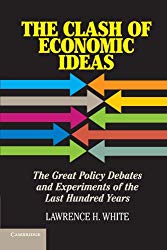I don’t know about you, but I’m a total sucker for lists. Which explain in part my newfound fascination with Five Books. Full disclosure- I’ll read anything. (I was the kid who read all the cereal boxes during breakfast…) And I read all the Five Books lists that arrive in my Inbox. Here, of course, I’m mostly interested in their “best book” lists on economics- and they have a lot. No longer can I stop myself from commenting on these, so here goes.
Given that it’s the beginning of a new semester for many, their (Five) Best Introductory Books on Economics caught my eye. So I was inspired to come up with my own list here. Of their selections, I’ll keep one- David Friedman’s Hidden Order.* Like Hamermesh, I like the illustrative vignettes in Friedman’s book, and it’s one of those book with broad appeal that can get a lot of people interested in learning more about economics. (Like Freakonomics, but better.)
I admit that I have not read Hamermesh’s second selection, Money Changes Everything. So I’m not rejecting it from my list for any other reason. (And in fact, I just ordered it… #EconlibReads, anyone?)
So what are the books I would put on this list? Here they are. Let me know what you think!
- Robert Heilbroner, The Worldly Philosophers. Like many of you, I am saddened by the dearth of history of thought classes in economics departments today. I used this book in teaching for years, and I’d still use it today. It combines historical detail with interesting anecdotes, which always served as nice hooks for my students. And as Heilbroner says in his Introduction, the emphasis throughout is on “the underlying nature of economic inquiry.”
- For the same reason, I also choose Larry White’s The Clash of Economic Ideas. (P.S. There’s an EconTalk for that!) This book also offers a terrific history of economic thought, this time in the guise of “the great policy debates of the last hundred years.” White takes a pro- con- approach that I’ve always found effective with students, as well as ideologically disarming. The weakness of this relative to Heilbroner is of course the truncated timeline (the first chapter, “The Turn Away from Laissez-Faire,” starts with Keynes at the dawn of the First World War). White’s history, however, contains much more detail, and also rests on the presumption of liberty, which for me is naturally appealing.
- You know I can’t create such a list without a book by EconTalk host Russ Roberts, though my specific pick may surprise some; it’s his novel, The Price of Everything. This story pits idealistic student Ramon against economics professor Ruth Lieber in a battle over the ‘evil’ of a big-box retailer, as Ramon objects to their ‘price-gouging’ in the wake of an earthquake… You all know how this one will end… It’s a lively story with lots of hooks for students relevant to events in the world today. (Honorable mention in this category goes to the original ‘economics novel,’ Murder at the Margin, by Marshall Jevons, which will always hold a special place in my heart.)
- For the best crash course in the economic way of thinking, Henry Hazlitt’s, Economics in One Lesson can’t be beat. Taking Frederic Bastiat’s parable of the broken window, Hazlett unravels all the most insidious fallacies of economic reasoning in clear, lucid, and often downright entertaining prose.
- Finally, speaking of clearly explained, I include Common Sense Economics. In some areas, this book repeats much of what is covered in the books above, But there’s one critical difference, and it’s what makes this title really stand out for me, and that’s the emphasis on economic freedom and public choice theory throughout. For anyone who’s perused a typical Introductory Economics textbook, you know that public choice, and any discussion of government failure, is abysmally absent. This is a corrective.
So what do you think? I’d love to hear what you think I’ve missed or gotten wrong here… Who knows? Your suggestions just may spark a new #EconlibReads program!
* As an Amazon Associate, Econlib earns from qualifying purchases.



READER COMMENTS
Jon Murphy
Oct 11 2019 at 5:36pm
Hooo boy. Yeah, it’s tough to come up with a top 5 list. I’d include Landsburg’s Armchair Economist.
Amy Willis
Oct 11 2019 at 6:37pm
Indeed! I set a goal to have this post up quite a while ago…It took me SO long to winnow down my list. (And Landsburg was definitely on it at various points.)
John Alcorn
Oct 11 2019 at 5:58pm
Off the beaten track:
John Meadowcroft, The Ethics of the Market (Palgrave Macmillan, 2005), here.
Deft and deep.
But the price set by the publisher is unpardonable! What does that say about the ethics of the market? 🙂
Shal Marriott
Oct 12 2019 at 8:19am
Although not a book, another piece worth mentioning when it comes to understanding economics I think is Hayek “The Use of Knowledge in Society”.
Amy Willis
Oct 15 2019 at 3:47pm
ABSOLUTELY, Shal!
John Alcorn
Oct 12 2019 at 9:08pm
A conspicuous omission!:
Thomas Sowell, Basic Economics, 5th edition (Basic Books, 2014), here.
Amy Willis
Oct 15 2019 at 3:48pm
So this, too, was on my initial brainstorm list, as was his “Classical Economics.” (Which I’m pretty sure will now become an Econlib ARG or VRG.)
Now you’re making me regret that omission… So many books, so little time!
Peter
Oct 13 2019 at 3:13pm
I’m more curious if anybody knows any good economics books for children kind of like “The Very Silly May”, by Tom Tomorrow, works pretty good on the libertarian front if you read it to your kids that way.
Jon Murphy
Oct 14 2019 at 8:38am
There’s a series out there called the Tuttle Twins that covers that reading group. I’ve not read them myself, so I cannot vouch for the quality.
Amy Willis
Oct 15 2019 at 3:48pm
As long as we keep The Rainbow Fish out of their hands! (Sorry- pet peeve, and surely an unpopular opinion.)
Vangel Vesovski
Oct 17 2019 at 12:33pm
The Heilbroner book has a very socialist viewpoint that I find inadequate. I wish that the author had been more clear that socialism has been a terrible failure and that it was the Austrians like Hayeks and Miseses who had the far better insights about what the future would bring. His book should be replaced with something better.
Jeffrey Pritchard
Oct 20 2019 at 11:41am
Thomas Sowell also is not a fan of Heilbroner’s book, which is the main reason I have never bothered to read it.
Comments are closed.